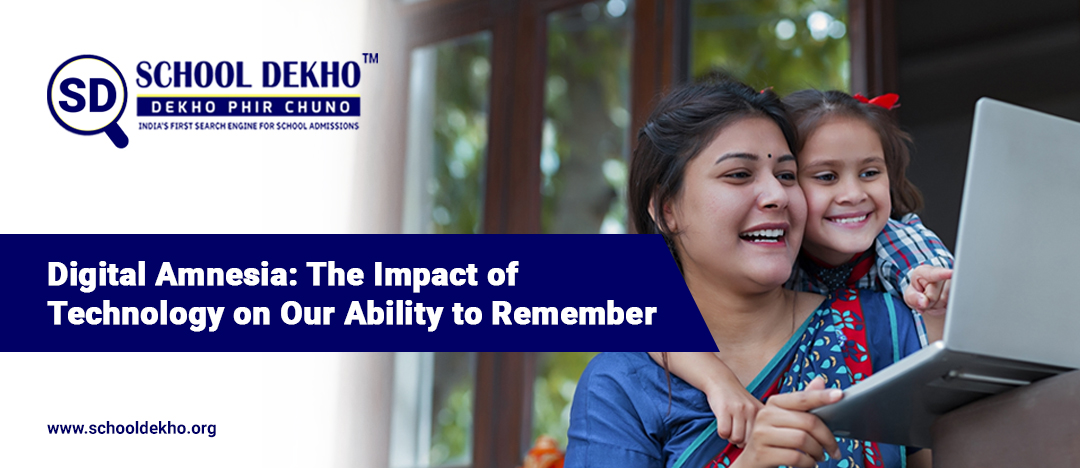Digital Amnesia: The Impact of Technology on Our Ability to Remember

In an age dominated by digital devices and constant connectivity, a curious phenomenon is emerging - digital amnesia. It's not the medical condition we typically associate with memory loss, but rather a modern-day cognitive quirk brought about by our heavy reliance on technology.
In this article, we'll explore what digital amnesia is, how it affects our memory, and what steps we can take to mitigate its impact.
The Digital Age and Memory
The digital age has ushered in a wealth of information at our fingertips. We no longer need to remember facts, phone numbers, or even directions because our devices can do it for us. While this convenience is undeniably helpful, it has unintended consequences for our memory.
- External Memory Storage: Our smartphones, tablets, and computers have become external memory storage devices. We store contact information, to-do lists, appointments, and more in these devices, relying on them to keep track of our lives. This reliance can lead to a decline in our ability to remember basic information.
- Reduced Cognitive Effort: When we know we can rely on our devices, we invest less cognitive effort in memorizing information. This "use it or lose it" principle applies to our memory too. If we don't use our memory regularly, it can weaken over time.
The Google Effect
Psychologists have termed this phenomenon the "Google effect." A study conducted by Betsy Sparrow and her colleagues at Columbia University found that people tend to forget information that is easily accessible online. Knowing that information is readily available on the internet, we become more inclined to forget it, which can lead to what is now known as digital amnesia.
Impact on Memory
Digital amnesia can have several negative effects on our memory and cognitive abilities:
- Shallow Processing: When we rely on technology to remember for us, we engage in shallower processing of information. Deep processing, which involves active engagement with information, is crucial for forming lasting memories.
- Impaired Problem-Solving: Memory plays a crucial role in problem-solving and critical thinking. A weak memory can hinder our ability to draw on past experiences and knowledge to solve new challenges.
- Reduced Creativity: Creativity often involves making novel connections between seemingly unrelated ideas, which relies on the memory's ability to store and retrieve diverse information.
Digital Amnesia: The Impact of Technology on Our Ability to Remember
In an age dominated by digital devices and constant connectivity, a curious phenomenon is emerging - digital amnesia. It's not the medical condition we typically associate with memory loss, but rather a modern-day cognitive quirk brought about by our heavy reliance on technology.
In this article, we'll explore what digital amnesia is, how it affects our memory, and what steps we can take to mitigate its impact.
The Digital Age and Memory
The digital age has ushered in a wealth of information at our fingertips. We no longer need to remember facts, phone numbers, or even directions because our devices can do it for us. While this convenience is undeniably helpful, it has unintended consequences for our memory.
- External Memory Storage: Our smartphones, tablets, and computers have become external memory storage devices. We store contact information, to-do lists, appointments, and more on these devices, relying on them to keep track of our lives. This reliance can lead to a decline in our ability to remember basic information.
- Reduced Cognitive Effort: When we know we can rely on our devices, we invest less cognitive effort in memorizing information. This "use it or lose it" principle applies to our memory too. If we don't use our memory regularly, it can weaken over time.
The Google Effect
Psychologists have termed this phenomenon the "Google effect." A study conducted by Betsy Sparrow and her colleagues at Columbia University found that people tend to forget information that is easily accessible online. Knowing that information is readily available on the internet, we become more inclined to forget it, which can lead to what is now known as digital amnesia.
Impact on Memory
Digital amnesia can have several negative effects on our memory and cognitive abilities:
- Shallow Processing: When we rely on technology to remember for us, we engage in shallower processing of information. Deep processing, which involves active engagement with information, is crucial for forming lasting memories.
- Impaired Problem-Solving: Memory plays a crucial role in problem-solving and critical thinking. A weak memory can hinder our ability to draw on past experiences and knowledge to solve new challenges.
- Reduced Creativity: Creativity often involves making novel connections between seemingly unrelated ideas, which relies on the memory's ability to store and retrieve diverse information.
Mitigating Digital Amnesia
While it's unlikely that we will (or should) abandon our digital devices, there are strategies to mitigate the effects of digital amnesia:
- Mindful Technology Use: Be conscious of your reliance on digital devices. Try to challenge your memory from time to time, even for simple tasks like phone numbers or shopping lists.
- Regular Mental Exercises: Engage in memory-boosting activities like puzzles, crosswords, and memory games to keep your cognitive faculties sharp.
- Active Learning: When learning something new, actively engage with the material rather than passively consuming it. Take notes, discuss it with others, and test your recall.
- Limit Screen Time: Excessive screen time can contribute to digital amnesia. Set limits on screen time and encourage face-to-face interactions and physical activities.
Digital amnesia is a byproduct of our digital age, and while it offers many conveniences, it also poses challenges to our memory and cognitive abilities. By recognizing the issue and adopting mindful technology use, we can strike a balance between the benefits of digital devices and the preservation of our own cognitive abilities. Remember, sometimes it's worth memorizing that phone number or address, not just because you might need it, but because it keeps your memory strong and agile.
While it's unlikely that we will (or should) abandon our digital devices, there are strategies to mitigate the effects of digital amnesia:
- Mindful Technology Use: Be conscious of your reliance on digital devices. Try to challenge your memory from time to time, even for simple tasks like phone numbers or shopping lists.
- Regular Mental Exercises: Engage in memory-boosting activities like puzzles, crosswords, and memory games to keep your cognitive faculties sharp.
- Active Learning: When learning something new, actively engage with the material rather than passively consuming it. Take notes, discuss it with others, and test your recall.
- Limit Screen Time: Excessive screen time can contribute to digital amnesia. Set limits on screen time and encourage face-to-face interactions and physical activities.
Digital amnesia is a byproduct of our digital age, and while it offers many conveniences, it also poses challenges to our memory and congnitive abilities. By recognizing the issue and adopting mindful technology use, we can strike a balance between the benefits of digital devices and the preservation of our own cognitive abilities. Remember, sometimes it's worth memorizing that phone number or address, not just because you might need it, but because it keeps your memory strong and agile.
Contact with Us
Call: 1800 - 2588 - 074
Mail: info@schooldekho.org
Student’s Best Education Portal | School Dekho | India's First School Search Engine | Best Schools Near Me | Find Schools Near Me | Dekho Phir Chuno
#dekhophirchuno






